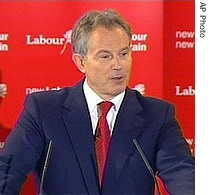2007年VOA标准英语-Outgoing British PM Blair's Foreign Policy Mark
时间:2019-01-13 作者:英语课 分类:2007年VOA标准英语(五月)
Washington
25 May 2007
British Prime Minister Tony Blair leaves office on June 27. In this report from Washington, Senior Correspondent André de Nesnera looks at Mr. Blair's legacy 1 in foreign affairs, a legacy largely defined by his support of the war in Iraq.

Prime Minister Tony Blair announces that he will step down as prime minister on June 27, 10 May 2007
Experts say in international affairs, outgoing British Prime Minister Tony Blair had an interventionist foreign policy, sending British troops to Bosnia, Kosovo, Sierra Leone, Afghanistan -- and Iraq.
Many analysts 2 say his decade in office will be forever marked by his decision to back the U.S.-led invasion of Iraq, coupled with his unwavering support of President George Bush, support that earned him the nickname, in some British quarters, of "Bush's poodle."
In a departure from the long-standing custom for a former U.S. president not to criticize a close ally, former U.S. President Jimmy Carter, in a recent interview on May 19 with British radio, used strong words in describing Mr. Blair's support for Mr. Bush.
"Abominable 3. Loyal. Blind - apparently 4 subservient," he said. "And I think the almost undeviating support by Great Britain for the ill-advised policies of President Bush in Iraq have been a major tragedy for the world."
Throughout his premiership, Mr. Blair argued that the world is better off now that Saddam Hussein is no longer in power. And he said the United States and Britain should not let the budding democracy in Iraq fail.
Many experts, including British historian Andrew Roberts, say strong opposition 5 to the war in Iraq from within Blair's own Labor 6 Party and from the British public in general, has effectively forced his early retirement 7, despite a third consecutive 8 election victory in May 2005.
"Now usually prime ministers stay on for four or five years; you don't have to hold elections for five years in this country," said Roberts. "He's going within two years and that's primarily because of his support for the Iraq war and for Mr. Bush."
"Those of us who believe that it was the right thing to have done to have overthrown 9 Saddam and to have fought the Iraq war think it's a great shame that a man should have been effectively forced out of office early because of that. However, there is no doubt that that was one of the reasons that he's leaving so early," he added.
Many British experts have criticized Mr. Blair for not exerting more influence on President Bush.
Jerry DeGroot, history professor at St. Andrew's University in Scotland, says that was Mr. Blair's biggest failure.
"It almost has a sort of Shakespearian tragedy about it, because I would even gather that the American people probably wanted Blair to have a moderating influence upon Bush," Degroot said. "But I think it simply reveals what probably previous prime ministers of Britain have realized, is that Britain simply doesn't pack the punch to be a moderating influence upon the United States, and particularly when there is a president in the White House who is dead set on a certain course."
During his speech earlier this month announcing he will leave office June 27, Mr. Blair defended his decision to stand shoulder to shoulder with President Bush following the September 11, 2001 terrorist attacks on the United States.
"And so Afghanistan and then Iraq -- the latter, bitterly controversial," said Blair. "And removing Saddam and his sons from power as with removing the Taleban, was over with relative ease."
"But the blowback since from global terrorism and those elements that support it has been fierce and unrelenting and costly 10. And for many it simply isn't and can't be worth it. For me, I think we must see it through. They, the terrorists who threaten us here and around the world, will never give up if we give up. It is a test of will and of belief, and we can't fail it," he continued.
When Tony Blair relinquishes 11 power in late June, Gordon Brown will replace him as prime minister. Experts do not expect any major shift in British policy regarding either Afghanistan or Iraq.
But they do say Brown will try to distance himself from President Bush while keeping the so-called "special relationship" between Washington and London on a more even keel.
- They are the most precious cultural legacy our forefathers left.它们是我们祖先留下来的最宝贵的文化遗产。
- He thinks the legacy is a gift from the Gods.他认为这笔遗产是天赐之物。
- City analysts forecast huge profits this year. 伦敦金融分析家预测今年的利润非常丰厚。
- I was impressed by the high calibre of the researchers and analysts. 研究人员和分析人员的高素质给我留下了深刻印象。
- Their cruel treatment of prisoners was abominable.他们虐待犯人的做法令人厌恶。
- The sanitary conditions in this restaurant are abominable.这家饭馆的卫生状况糟透了。
- An apparently blind alley leads suddenly into an open space.山穷水尽,豁然开朗。
- He was apparently much surprised at the news.他对那个消息显然感到十分惊异。
- The party leader is facing opposition in his own backyard.该党领袖在自己的党內遇到了反对。
- The police tried to break down the prisoner's opposition.警察设法制住了那个囚犯的反抗。
- We are never late in satisfying him for his labor.我们从不延误付给他劳动报酬。
- He was completely spent after two weeks of hard labor.艰苦劳动两周后,他已经疲惫不堪了。
- She wanted to enjoy her retirement without being beset by financial worries.她想享受退休生活而不必为金钱担忧。
- I have to put everything away for my retirement.我必须把一切都积蓄起来以便退休后用。
- It has rained for four consecutive days.已连续下了四天雨。
- The policy of our Party is consecutive.我党的政策始终如一。
- It must be very costly to keep up a house like this.维修这么一幢房子一定很昂贵。
- This dictionary is very useful,only it is a bit costly.这本词典很有用,左不过贵了些。
- She relinquishes him to a partner more appropriate. 结果是,她抛弃了他,找了个年龄相当的伴侣。